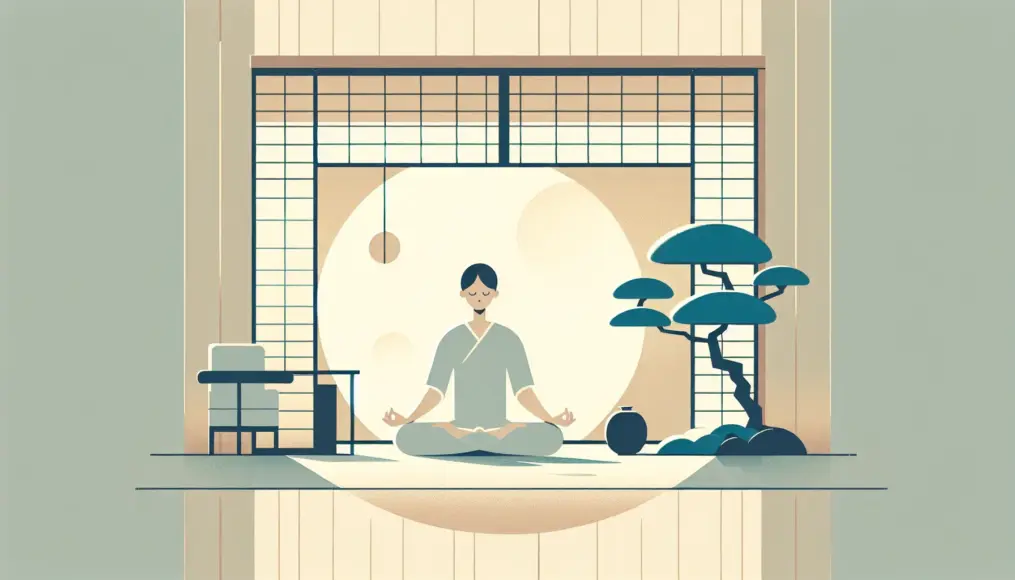Meditation is a fantastic tool for calming the mind and reducing stress. Recently, more and more people have been experiencing its benefits and incorporating it into their daily lives. Don’t you want to find a sense of tranquility amidst the hustle and bustle of everyday life?
In this article, we’ll delve into the effects of meditation and how to practice it effectively. We’ll outline easy steps for beginners to get started and support your journey into meditation. We will also explore the scientific perspective on how meditation impacts both the mind and body, ensuring you’ll uncover some new insights along the way.
So, why not take that first step into the world of meditation? By centering your mind, you can achieve a more fulfilling daily life.
- Learn the basics of meditation and its history
- What are the scientifically proven benefits of meditation?
- Introducing meditation techniques that are easy for beginners
What is the Essence of Meditation?
Meditation is a mental training practice that has been embraced by numerous cultures from ancient times to the present day. Across various religions and philosophies, meditation is regarded as a key method for achieving spiritual growth and inner peace. Recently, meditation aimed at relieving stress and enhancing focus has become more popular, with many people incorporating it into their daily routines.
In this section, we will explore the history and background of meditation, as well as consider its role in modern life and how it contributes to our well-being.
The History and Background of Meditation
The origins of meditation can be traced back to ancient India, where practices based on Hindu and Buddhist teachings were developed to calm the mind. Ancient texts often describe how meditation can help sharpen focus and provide spiritual insights. This tradition spread to many countries in Asia, leading to the emergence of various styles and techniques.
In today’s world, meditation transcends its religious roots, gaining recognition in fields like psychology and health promotion. Research has shown that meditation can reduce stress and improve mental health. As a result, it has become widely accepted as a form of mental self-care.
- Meditation originated in ancient India
- Practices based on Hindu and Buddhist teachings have evolved
- It is now also recognized in psychology and health promotion
The Role of Meditation in Modern Life
Modern society is often filled with busyness and stress, making time to calm the mind increasingly important. Meditation serves as a valuable tool for resetting ourselves amid the chaos of everyday life. Even a short session of meditation can help organize thoughts and enhance concentration.
Additionally, meditation is widely known as a practice of mindfulness, encouraging us to focus on the present moment, which promotes mental well-being. This practice offers various benefits, such as improved emotional regulation and deeper self-understanding. Many individuals find that by incorporating meditation into their lives, they can enjoy a richer, more fulfilling existence.
- Meditation is a means to reset the mind
- Effective as a practice of mindfulness
- It deepens emotional control and self-understanding through meditation
Understanding the Benefits of Meditation
Meditation is widely recognized for its various positive effects on both the mind and body. Not only does it help reduce stress and promote relaxation, but it can also enhance focus and creativity. These benefits can lead to improved performance in work and study. In this section, we’ll take a closer look at the effects of meditation.
We’ll start by examining its impact on the mind and body, followed by a discussion of scientifically proven benefits that illustrate how meditation can enhance our daily lives.
The Impact on Mind and Body
Meditation benefits not just our mental state but also our physical health. By promoting relaxation, it helps decrease stress hormones and stabilizes heart rate and blood pressure. This refreshing effect on the mind and body leads to better performance in everyday activities.
Additionally, meditation fosters greater self-awareness and makes it easier to manage emotions. As a result, individuals are less likely to be overwhelmed by negative feelings, allowing for healthier and more fulfilling relationships.
- Meditation reduces stress hormones
- Stabilizes heart rate and blood pressure
- Enhances self-awareness and emotional regulation
Scientifically Proven Benefits
Recent research has scientifically validated various benefits of meditation. For instance, regular meditation practice has been shown to change brain structure, improving memory and attention. Moreover, many studies have reported its effectiveness in reducing stress and anxiety.
Meditation has also been shown to enhance immune function. It helps reduce inflammation in the body, supporting a healthier lifestyle. Thus, not only does meditation positively affect the mind and body, but its benefits are also backed by scientific evidence.
- Meditation changes brain structure, improving memory and attention
- It effectively reduces stress and anxiety
- Enhances immune function, supporting a healthy lifestyle
Recommended Meditation Techniques for Beginners
Many people want to start meditating but aren’t sure where to begin. By learning about accessible meditation techniques, you can more easily incorporate mindfulness into your daily routine. In this section, we’ll explore simple breathing meditation and guided meditation, discussing how to practice each and their benefits.
Let’s start with one of the most fundamental forms of meditation: “breathing meditation.” After that, we’ll delve into how to effectively use “guided meditation,” which is especially recommended for beginners.
Simple Breathing Meditation
Breathing meditation is one of the simplest methods available. Begin by finding a quiet place to sit, close your eyes, and relax. Focus your attention solely on your breath. Notice the sensations as you inhale and exhale. If thoughts arise, gently bring your focus back to your breathing.
This technique helps anchor your awareness to the present moment, making it effective for reducing stress and stabilizing your mind. Even beginners can easily engage with this practice and feel its benefits in just a short amount of time.
- A straightforward method focusing on your breath
- Gently return to your breath when thoughts come up
- Effective for stress relief and mental stability
Utilizing Guided Meditation
Guided meditation involves following instructions provided through audio or an app. For beginners, having guidance can make the meditation experience more comfortable. Many apps offer a variety of themes and time settings, allowing you to choose what suits you best.
Guided meditation is particularly beneficial when you want to relax or when you have a specific intention in mind. With calming music or narration included, you can experience deeper relaxation and tranquility.
- A meditation method that offers instructions via audio or an app
- Provides a safe space for beginners to practice
- Choose meditations based on relaxation needs or specific goals
Tips for Incorporating Meditation into Your Daily Life
To truly experience the benefits of meditation, it’s essential to integrate it into your everyday routine. However, maintaining a meditation practice can be a challenge in our busy lives. In this section, we’ll outline steps to make meditation a habit, as well as key points to ensure its effects last. By following these tips, you’ll find it easier to weave meditation into the fabric of your daily life.
First, we’ll look at specific steps to establish a meditation routine, and then we’ll discuss what you can do to make those benefits stick.
Steps to Make Meditation a Habit
To incorporate meditation into your daily life, it’s crucial to determine “when” and “where” you’ll practice. Setting aside specific times, like right after you wake up or just before bed, can help solidify this habit. Choosing a quiet spot also sets the stage for better focus during your sessions.
Additionally, it’s advisable to start with shorter sessions. Beginning with just five minutes of meditation and gradually extending the duration as you become more comfortable can make it easier to maintain the practice. This approach allows you to build a sustainable habit without feeling overwhelmed.
- Decide “when” and “where” you’ll meditate
- Start with short sessions and gradually increase the time
- Choose a quiet location to create a conducive environment
Keeping the Benefits Going
To sustain the benefits of meditation, regularly reflecting on your practice is key. By jotting down the changes and emotional shifts you experience through meditation, you can keep your motivation high. Additionally, experimenting with different meditation styles or techniques can help keep things fresh and engaging.
Meditating with friends or family can also be highly effective. Sharing the experience not only provides mutual encouragement but also makes the practice more enjoyable. By incorporating these strategies, you can experience the lasting benefits of meditation more fully.
If you’re interested in a deeper understanding of the benefits you can gain from daily meditation, check out this article: “Surprising Benefits of Daily Meditation: Experience Changes in Your Mind and Body.” This piece dives into how daily meditation can enhance your mental peace, reduce stress, and improve focus, so be sure to take a look!
- Regularly reflect on your practice and note changes
- Change up your meditation style or content to keep it fresh
- Meditate with others for mutual support
Conclusion
Meditation is a fantastic practice that brings numerous benefits to both the mind and body. It’s particularly well-suited for our fast-paced modern lives, as it helps reduce stress, improve focus, and gain better control over emotions. In this article, we’ve explored the fundamentals of meditation, its effects, and some beginner-friendly techniques to get started. No matter which method you choose, gradually incorporating meditation into your routine can help you find your own sense of inner peace.
Take note of the steps to make meditation a habit and tips to sustain its benefits, and try to weave it into your daily life. Even starting small can lead to noticeable effects over time.
- Meditation positively impacts the mind and body
- There are approachable methods for beginners
- Taking steps to establish a routine is crucial
We’d love to hear about your meditation experiences! Feel free to share how you incorporate it into your life in the comments.



Comment